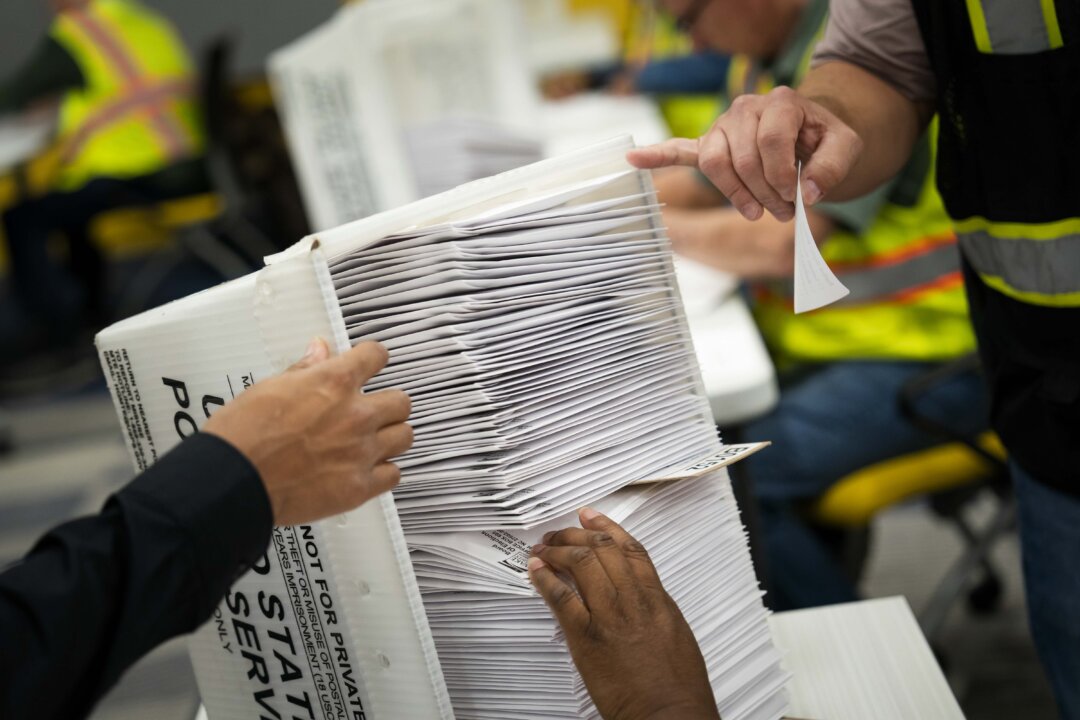A lower court previously held that not counting undated ballots violated the state constitution.
The Pennsylvania Supreme Court on Nov. 1 granted Republicans’ request to clarify that undated mail-in ballots can’t be counted in the 2024 general election.
The Republican National Committee and Pennsylvania Republican Party submitted a request for emergency relief on Oct. 31, arguing that an appeals court had incorrectly ruled that the Philadelphia Board of Elections must count a set of undated envelopes in a September special election for the Pennsylvania House of Representatives.
According to the Republicans, the decision was not only incorrect in its reasoning but also contained an order they feared wasn’t specific enough and would be applied to other counties in the November elections.
The state supreme court’s Nov. 1 order granted the request for a stay and said the appeals court decision “shall not be applied to the November 5, 2024 General Election.”
The appeals court’s Oct. 30 ruling held that refusing to count undated ballots violated the “free and equal elections clause” of the Pennsylvania constitution, which reads: “Elections shall be free and equal; and no power, civil or military, shall at any time interfere to prevent the free exercise of the right of suffrage.”
Requiring dated ballots, the court said, infringed on a fundamental right to vote and did so in a way that didn’t serve a compelling government interest.
“As the undisputed factual findings underlying the trial court’s order illustrate, thousands of Pennsylvania voters have been disenfranchised by the County Board’s rejection of their mail ballots due to missing or incorrect dates on their ballot envelopes,” the appellate judges wrote.
Republicans argued that the appeals decision created a problem with equal protection under the law since it was arguing that just one county had to abide by this interpretation of the state constitution.
“Some county boards might accept the [appeals court] majority’s reassurance that its latest attack on the date requirement applies only to the past Philadelphia special election,” they said in their request for relief.
“But that would result in different county boards applying different standards for determining the validity of mail ballots, a textbook violation of the Equal Protection Clause of the U.S. Constitution and the Pennsylvania Constitution.”
The two rulings took place just days before the November elections, raising questions about a U.S. Supreme Court precedent (Purcell v. Gonzalez) that cautions against last-minute changes to election procedures.
The appeals court disagreed that the precedent applied to this particular case, noting that it was not being asked to make changes to the pending 2024 elections but rather the special election.
This case was one of many election-related cases to develop within the commonwealth in the weeks leading up to the election.
Republicans also asked the U.S. Supreme Court to halt a separate decision by the state supreme court allowing voters to cast provisional ballots after improperly submitting mail-in ballots. The highest court rejected the request on Nov. 1.
A judge in Pennsylvania also issued a preliminary injunction on Oct. 30 preventing the Bucks County Board of Elections from turning away individuals who show up to apply for mail-in ballots. Republicans had filed a lawsuit accusing Bucks County of disobeying state law by turning away voters at county elections offices and refusing to process mail-in ballot applications.
Billionaire Elon Musk is being sued by Philadelphia District Attorney Larry Krasner over the former’s alleged “illegal lottery” involving a $1 million giveaway. A federal judge sent the case back to the Philadelphia County Court of Common Pleas after Musk’s legal team requested federal court to pick up the case. The case is set to resume on Monday in the state court.

